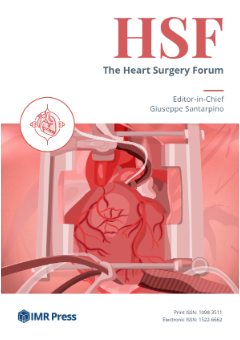Announcements
The Heart Surgery Forum (HSF) is published by IMR Press from Volume 28 Issue 9 (2025). Previous articles were published by another publisher under the CC-BY-NC licence, and they are hosted by IMR Press on imrpress.com as a courtesy and upon agreement.
Open Access
Article
Predictors of Early Deterioration of Renal Function in Patients Older Than 70 Years Undergoing Valvular Surgery
Ljiljana Ranković-Ničić, MD1, Dragana Unić-Stojanović, MD, PhD1,3, Maja Milošević, MD2, Slobodan Mićović, MD, PhD3,4, Tjaša Ivošević, MD, PhD3,5, Milica Stojicic, MD1, Petar Otašević, MD, PhD2,3
Show Less
Affiliation
1
Clinic for Anesthesia and Intensive Care, Dedinje Cardiovascular Institute, Belgrade, Serbia
2
Cardiology Services, Dedinje Cardiovascular Institute, Belgrade, Serbia
3
Belgrade University School of Medicine, Belgrade, Serbia
4
Clinic for Cardiac Surgery, Dedinje Cardiovascular Institute, Belgrade, Serbia
5
Center for Anesthesiology and Resuscitation, Clinical Center of Serbia, Belgrade, Serbia
Heart Surg. Forum 2022, 25(2),
196–203;
https://doi.org/10.1532/hsf.4387
Published:
17 March 2022
Abstract
Background:Cardiac surgery-associated acute kidney injury (CSA-AKI) is the most common clinically important complication in adult patients undergoing open-heart surgery, with an incidence between 8.9% and 39%. Studies have shown that even a slight increase in serum creatinine levels after cardiac surgery significantly affects the mortality and morbidity of these patients.Aim:This study sought to determine the predictors and incidence of acute kidney injury (AKI) in patients older than 70 years undergoing elective valvular surgery.Methods:Prospective study included 156 patients scheduled for elective cardiac surgery requiring cardiopulmonary bypass (CPB) at Dedinje Cardiovascular Institute between January and September 2019. Isolated valvular surgery was performed in 87 patients, while the remaining 69 patients underwent combined coronary and valvular surgery. The development and stage of CSA-AKI were diagnosed, according to Kidney Disease Improving Global Outcome (KDIGO) criteria. Predictors and incidence of CSA-AKI development were assessed using univariate binary logistic regression analysis.Results:The incidence of CSA-AKI was 17.3%. CSA-AKI stage 1 was diagnosed in 25 patients (16.02%). CSA-AKI stage 2 was noted in one patient (0.64%), as well as stage 3 (0.64%). In six patients (3.85%), renal replacement therapy (RRT) was required. Using univariate binary logistic analysis, the following parameters were identified as predictors for CSA-AKI development: duration of cardiopulmonary bypass (OR 1.01; CI 95% (1.01-1.02);P= .002), duration of aortic clamping (OR 1.02; CI 95% (1.01-1.03);P= .002), lactate levels during the intensive care unit (ICU) stay (OR 1.33; CI 95% (1.04-1.70);P= .026), duration of mechanical ventilation (MV) (OR 1.03; CI 95% (1.1-1.07);P= .014), the use of inotropic drugs (adrenaline, dobutamine) (OR 0.38: CI 95% (0.16-0.9);P= .026; and OR 0.23; CI 95% (0.1-0.56);P= .0019, respectively), and the use of diuretics (OR 0.24; CI95% (0.06-095);P= .041). Using Mann-Whitney U test for independent samples show that the group of patients who developed CSA-AKI had significantly longer duration of hospitalization (Z = -2.751);P= .006), prolonged ICU stay(Z = -4.160;P< .001), and need for prolonged mechanical ventilation (Z = -4.411;P< .001).Conclusion:Independent predictors for AKI development after valvular surgery in patients older than 70 years are prolonged mechanical ventilation and increased lactate values, while the use of diuretics after surgery reduces the incidence of AKI. Also, the development of CSA-AKI is associated with prolonged ICU stay and a longer duration of hospitalization.
Keywords
Acute kidney injury
cardiac surgery

